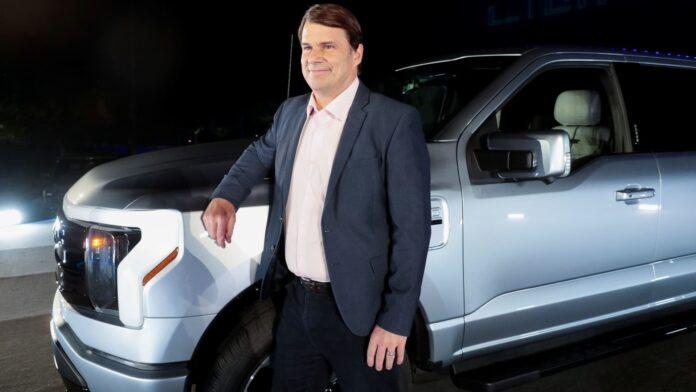Ford CEO Jim Farley poses with the Ford F-150 Lightning pickup truck in Dearborn, Michigan, May 19, 2021.
Rebecca Cook | Reuters
WAYNE, Mich. – Ford Motor CEO Jim Farley does not expect the costs of raw materials for the company’s electric vehicles to ease in the near future, marking the latest signal that automakers will continue hiking prices for their new EVs.
“I don’t think there’s going to be much relief on lithium, cobalt and nickel anytime soon,” Farley told reporters Wednesday during an event at the automaker’s Michigan Assembly Plant.
Farley’s comments come a day after the Detroit automaker announced it would be raising the starting prices for its electric F-150 pickup due to “significant material cost increases.” The increases range from $6,000 to $8,500, depending on the model. Ford isn’t alone: Rival Tesla increased its U.S. prices in June.
Prices of all lithium, cobalt and nickel have risen sharply over the past year as demand from battery makers has outpaced miners’ efforts to increase supply.
Farley said the fast-rising costs of the minerals used in its current lithium-ion batteries are why Ford plans to offer lower-cost lithium iron phosphate, or LFP, batteries in vehicles such as the F-150 Lightning and Mustang Mach-E crossover.
“I don’t think we should be confident in any other outcomes, than an increase in prices,” he said. That’s why we think LFP technology is critical … We want to make these affordable.”
Last month, Ford said it will begin offering LFP batteries from Chinese battery giant CATL that don’t use nickel or cobalt as a lower-cost option in the Mustang Mach-E next year. The company plans to expand the option to the F-150 Lightning in 2024.
Ford also has invested in Colorado-based battery startup Solid Power, one of several companies working to develop solid-state batteries for electric vehicles. Solid-state batteries have the potential to offer EV owners more range, shorter recharging times, and a lower risk of fires than today’s batteries.
Solid Power said Tuesday that it’s on track to deliver prototype batteries to Ford and BMW, also an investor, by the end of the year. But vehicles using the batteries are still at least a few years away.


